Author: Anna-Leena Ekroos
The princess who quit
27 February 2014 | Authors, Interviews
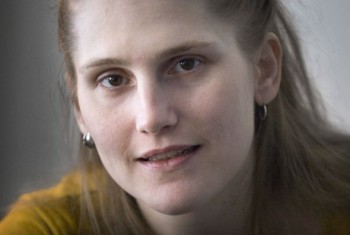
Alexandra Salmela. Photo: Heini Lehväslaiho
Interview with Alexandra Salmela, whose second book, Kirahviäiti ja muita hölmöjä aikuisia (‘The giraffe mummy and other silly adults’, Teos, 2013), is for children – and for those adults who admit their silliness
Once upon a time there was a boy called Sulo. Just a normal lad, more a middle-of-the-road character than winner material. And not even always brave, let alone cheerful. An ordinary sprog isn’t enough for Sulo’s parents, so they take the boy to a child repair shop. There, new parts are fitted to children: virtuoso fingers, football-feet and angel-faces.
In addition to Sulo, Alexandra Salmela’s Kirahviäiti ja muita hölmöjä aikuisia (‘The giraffe mummy and other silly adults’) introduces us to the misunderstood Flabby Monster, Adalmiina, who wings through trees like an ape, and a father who absentmindedly loses his head. The work is the second book by Alexandra Salmela, who was born in Bratislava, in what was then Czechoslovakia, and now lives in Tampere.
A-L E: How did the idea of a story-book come up? More…
The party’s not yet over
14 November 2013 | Authors, Interviews
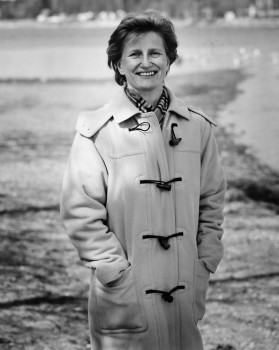
Minna Lindgren. Photo: Ville Palonen
Ordinary, boring, controlled life in an old folks’ home takes an interesting turn as crimes are committed. But daily tramrides in Helsinki, the virtues of friendship and general joie de vivre are enjoyed by 90-year-plus-old ladies who refuse to act as expected – as Bette Davis put it, old age is no place for sissies. Minna Lindgren is interviewed by Anna- Leena Ekroos
Welcome to Twilight Grove, a Helsinki home for the elderly – the bright, institutional lighting in its parlour creating an atmosphere like a dentist’s office, the odd resident dozing on the sofas, waiting for the next meal. The menu often includes mashed potatoes, easy for those with bad teeth. Residents seeking recreation are offered chair aerobics, accordion recitals, and crafts. A very ordinary assisted living centre, or is it? In Minna Lindgren’s novel, Kuolema Ehtoolehdossa (‘Death at Twilight Grove’, Teos), the everyday life of a home for the elderly is the setting for absurd and even criminal happenings, suspicious deaths and medical mix-ups.
Anna-Leena Ekroos: You’re a journalist and writer. Formerly you worked for the Finnish Broadcasting Company. In 2009 you won the Bonnier journalism prize for an article of yours about the last phases of your father’s life, and his death. Kuolema Ehtoolehdossa is your first novel. How did it come into being?
Minna Lindgren: I’ve always known I was a writer but the mere urge to write isn’t enough for a novel – you have to have a meaningful story. The more absorbed I became in the life of the old, the more important it felt to me to write this story. Writing a novel turned out to be carefree compared to working as a journalist. Many of the stories I heard would have become bad social porn in the media, dissolved into banality, but in a novel they become genuinely tragic, or tragicomic, as the case may be. More…
Journeys to nearby places
18 April 2013 | Authors, Interviews
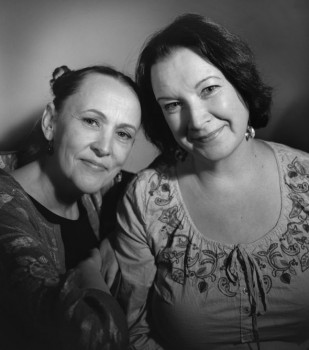
Workmates: Virpi Talvitie and Katri Tapola. Photo: Teos
Short texts and vibrant illustrations merge composing capricious situations in Katri Tapola and Virpi Talvitie’s adult picture book. Mahdollisuuksien rajoissa. Matkakirja (‘In the realm of impossibility. Travel book’, Teos, 2013) turns the ordinary pleasantly askew
It is a different kind of travel book: instead of faraway places, it explores things nearby, where our gaze and our thoughts don’t usually pause – the little things at the bottom of a pocket, in a dark closet full of outdoor gear, quiet moments in noontime traffic.
The travellers are perhaps Nobody in Particular, or somebody called Random. We keep on travelling, but we don’t get any farther than the corner store. What’s small becomes large, what’s supposedly large shrinks. Our self-image is off-kilter, there’s a hole in our CV, and the world is pleasantly tilted.
A-L E: The book is in the form of short prose – a page, half a page. What was it like to write these compact texts?
K T: I love having constraints; the short form is very rewarding. Focus and compactness make your whole life clear. And this has been good for me to learn because I’m naturally prone to long, extended forms of expression. More…
Movies and mores
16 April 2012 | Authors, Interviews
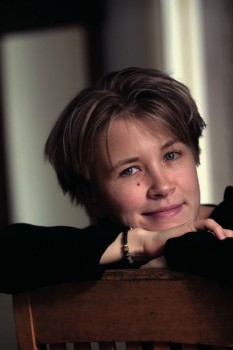
Tuuve Aro. Photo: Liisa Takala
Interview with Tuuve Aro, author of Himokone (‘Desire machine’): in these short stories she borrows titles and ambiance from the silver screen
A dark theatre, the smell of popcorn, expectation quivering in the air. Since childhood, the author and film critic Tuuve Aro (born 1973) has loved that magic moment when a new, exciting story is about to begin once again on the silver screen.
The stories in her fourth short story collection Himokone (‘Desire machine’, WSOY, 2012) have taken their names from films – Vertigo, Alien, and Invasion of the Body Snatchers, for example. The book’s title comes from a certain Dr Samuel L. Brimstone, member of the ‘Royal Film Academy of Suffolk’: according to him, a film projector is a desire machine: it doesn’t give anything, it only shows, and for that very reason it is hard to resist. More…
Fools and devils
Issue 2/2007 | Archives online, Authors, Interviews, Reviews
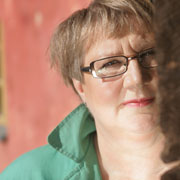
Anneli Kanto. Photo: Gummerus/Milka Alanen
Witch trials began to be history in 17th century Finland, thanks to the arrival of the country’s first university and an enlightened Governor-general. A new novel by Anneli Kanto is in those times, with a wandering theatre troupe as its focus. Anna-Leena Ekroos talks to the author
Laurentius Petrus Bircalensis, a poor boy from a backwoods village, is accepted to study at the recently founded Åbo Academy, the first university in Finland, in the town of Åbo (known as Turku in Finnish). The young studiosus, greedy for money, is more interested in occult than in theological studies, and becomes charged with witchcraft. Desperate, Laurentius flees a death sentence to wander the countryside with the Comet theatre troupe.
Journalist, theatre critic and playwright Anneli Kanto’s mischievous and adventurous first novel Piru, kreivi, noita ja näyttelijä (‘The devil, the count, the witch and the actor’) takes us to 17th-century Finland, to the days of the Swedish Count Per (Petrus) Brahe, the Governor-General of Finland. At that time the eradication of the ignorance and superstition of the peasantry was beginning in earnest. More…
-
About the author
Anna-Leena Ekroos (born 1968) is a freelance journalist and critic living in Vaasa.
© Writers and translators. Anyone wishing to make use of material published on this website should apply to the Editors.
